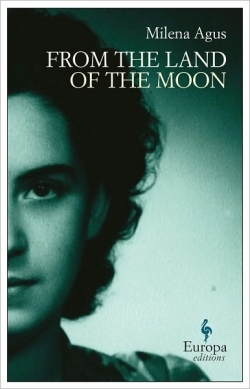From the Land of the Moon
Winner of the Zerilli-Marimò prize, From the Land of the Moon is a young woman’s lovely and poignant account of a family, and a grandmother’s search for love.
Place is central to this novel—the author’s native Sardinia, with the sea, the seasons, and mistrals; and foggy Milan, full of people and massive buildings. Houses and cities are built, destroyed, longed for. A girl cries for her native Genoa, another recreates a loved room in a new home, and the neighbors who share a crumbling kitchen in the difficult years after the war become the grandmother’s new village. But it is the landscape of the woman as artist that is most haunting, the homeland of one whose sensibilities are so unfathomable and alien to others that one might as well be “from the land of the moon.”
Thought a madwoman by her family, as a young girl the grandmother is beaten, shut up in the hayloft, or tied to a bed with rags when her despair overcomes her. Unloved and misunderstood, she writes secretly in a notebook. Her family marries her to a widower, who moves her to the town of Cagliari, where a calmer, if loveless, life begins. Sent to thermal baths for medical treatment, the grandmother meets the Veteran, the one man who understands and perhaps loves her. In response, she “emerge[s] from her silence.” Sustained by a vision of love, assured that she is not mad, she begins to live.
The story is not without its small mercies. Even stern or silent characters perform kindnesses that reveal their own longings. But love, that most “principal thing,” remains elusive: “[I]f it doesn’t want to come it won’t, with bed or even with kindness and good deeds, and it was strange that here was the most important thing, and there was no way to make it happen, by any means.”
While the grandmother pays the highest price for her poetic nature, she is not the only one who seeks beauty. The family is full of secret poets and obsessive musicians. Each must discover and honor the “principal thing,” and if later generations don’t suffer the heartbreak of the grandmother’s era, they recognize the difficulties of knowing or responding fully to even those they love best. And the surprising end of the novel perhaps indicates that the bittersweet quality of longing and the power of imagination are the best one can hope for.
Author and translator have produced a work notable for the quality of its prose—pure, luminous language that perhaps mirrors the quality of Mediterranean light, both elemental and “astonishingly rich.”
Reviewed by
Teresa Scollon
Disclosure: This article is not an endorsement, but a review. The publisher of this book provided free copies of the book to have their book reviewed by a professional reviewer. No fee was paid by the publisher for this review. Foreword Reviews only recommends books that we love. Foreword Magazine, Inc. is disclosing this in accordance with the Federal Trade Commission’s 16 CFR, Part 255.

